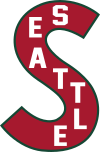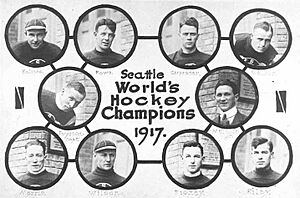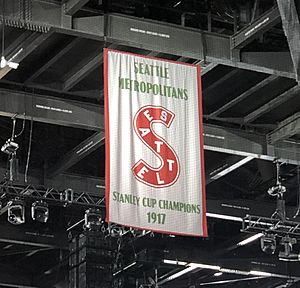Seattle Metropolitans facts for kids
Quick facts for kids Seattle Metropolitans |
|
|---|---|
| City | Seattle, Washington |
| League | PCHA |
| Founded | 1915 |
| Home arena | Seattle Ice Arena |
| Colors | Green, red, white |
| Head coach | Pete Muldoon |
| Championships | |
| Regular season titles | 5 (1917, 1918, 1920, 1922, 1924) |
| Stanley Cups | 1 (1917) |
| Playoff championships | 3 (1917, 1919, 1920) |
The Seattle Metropolitans were a professional ice hockey team from Seattle, Washington. They played in the Pacific Coast Hockey Association (PCHA) from 1915 to 1924.
During their nine seasons, the Metropolitans were the most successful team in the PCHA. They won five regular season championships. They also finished second three other times. The Metropolitans played their home games at the Seattle Ice Arena. This arena could hold 2,500 fans.
The Metropolitans reached the playoffs seven times in nine seasons. They played for the Stanley Cup three times between 1917 and 1920. The team won the Stanley Cup in 1917. They became the first American team ever to win the Cup. The 1919 Stanley Cup Finals ended in a tie. They lost in five games in the 1920 finals. The Metropolitans stopped playing in 1924. This happened because they could not find a new arena. Seattle's next team to play for the Stanley Cup was the Seattle Kraken, which started in 2021.
Contents
Team History: The Seattle Metropolitans
The Metropolitans team was started in 1915. It was an expansion team for the Pacific Coast Hockey Association. The owners were Frank and Lester Patrick. The team got its name from the Metropolitan Building Company. This company built the Seattle Ice Arena.
In 1915, there was a big competition for players. The Metropolitans signed several talented players. These players came from another team, the Toronto Blueshirts. The Blueshirts had won the Stanley Cup in 1914. This helped Seattle become a strong team right away. Key players included Eddie Carpenter, Frank Foyston, Hap Holmes, Jack Walker, and Cully Wilson. Coach Pete Muldoon also signed Bobby Rowe and Bernie Morris. Morris scored the winning goal in the team's first game. He later became a five-time PCHA All-Star.
Most hockey players back then signed one-year contracts. This meant players often moved between teams. But the Metropolitans kept many of their players for a long time. Seven players stayed with Seattle for seven or more seasons. Foyston, Walker, and Rowe played all nine seasons. Morris, Holmes, and Rickey played for eight years. Jim Riley played for seven seasons.
The team's official scorer was Royal Brougham. He was a famous sports writer. He covered Seattle sports for 68 years.
Winning the First U.S. Stanley Cup
Seattle won the 1917 championship. They beat the National Hockey Association's Montreal Canadiens. Seattle won three games to one. The total score was 23–11. The Canadiens were expected to win easily. They beat Seattle in Game 1. But the Metropolitans came back strong. They won Games 2, 3, and 4. They outscored Montreal 19-3 in those games. Bernie Morris scored 14 of Seattle's goals. He even scored six goals in Game 4 alone.
Games were played under different rules. Games 1 and 3 used PCHA rules. These rules included seven players per side. They also allowed forward passing in the middle of the ice. If a player got a penalty, no one could take their place. Games 2 and 4 used NHA rules. These rules had six players per side. Forward passing was not allowed. Players could be replaced if they got a penalty.
Later Years and Challenges
After their 1917 Stanley Cup win, the Metropolitans played in two more finals. They were in the 1919 and 1920. The 1919 finals were cancelled because of the Spanish flu pandemic. The series was tied 2-2-1 after five games. In 1920, they lost to the Ottawa Senators.
In 1919, star player Bernie Morris was arrested. This happened on the day the playoffs started. He was jailed for avoiding the draft, even though he was a Canadian citizen. Without him, the Metropolitans still won their league championship. They then led the Stanley Cup Finals 2-1 against Montreal. Frank Foyston scored eight goals in those games. Game 4 of the 1919 finals was a scoreless tie. Game 5 went into overtime. The Metropolitans were tired and had injured players. Montreal scored to win, making the series 3-2. The next morning, the Spanish flu hit both teams. It sadly killed Montreal's Joe Hall. Four other Canadiens players also got sick. Montreal offered to give up the Cup. But Seattle's coach and owner said no. They believed championships should be won by playing the game.
During the 1920 Stanley Cup finals, the Ottawa Senators wore white uniforms. This was so their colors wouldn't get mixed up with Seattle's green, red, and white striped jerseys. Some games in the series had to be moved. They went from Ottawa to Toronto. This was because the ice in Ottawa was not good.
The PCHA had four teams for a few seasons. Then it had only three teams until 1924. In the last few years, games against another league, the Western Canada Hockey League (WCHL), counted in the PCHA standings. This allowed Seattle to win their league championship in 1924, even with a losing record.
After the 1924 season, the Seattle Ice Arena was needed for other uses. The University of Washington, which owned the land, ended the team's lease. The team tried to find money for a new arena. When they couldn't, the Metropolitans team stopped playing. Many of their players joined another team in Victoria. The Vancouver and Victoria teams then joined the WCHL.
Tributes to the Metropolitans
Later hockey teams in Seattle have honored the Metropolitans. The NHL owns the rights to the Metropolitans' team name in Canada. In the U.S., a businessman named Paul Kim bought the rights in 2016. He wanted to let a future Seattle NHL team use them.
On December 5, 2015, the Seattle Thunderbirds held a special "Seattle Metropolitans Night." This celebrated 100 years of hockey in Seattle. The team wore special jerseys that looked like the original Metropolitans jerseys. They even changed their name to the Seattle Metropolitans for the game. They won 3–2.
The Seattle Jr. Totems also honored the team. In November 2019, they had a "Seattle Hockey History Weekend." They wore the Metropolitans' colors during their games.
The "S" logo of the National Hockey League's Seattle Kraken was designed to look like the Metropolitans' uniforms. On October 26, 2021, the Kraken raised a 1917 Stanley Cup Championship banner. This happened at Climate Pledge Arena. It was before their game against the Montreal Canadiens. This was the first time Montreal played a regular game in Seattle since the 1919 Stanley Cup Finals.
Season-by-Season Results
Here is a look at how the Seattle Metropolitans performed each season.
Note: GP = Games played, W = Wins, L = Losses, T = Ties, Pts = Points, GF = Goals for, GA = Goals against
| PCHA season | GP | W | L | T | PTS | GF | GA | PIM | League Finish |
Playoffs |
|---|---|---|---|---|---|---|---|---|---|---|
| 1915–16 | 18 | 9 | 9 | 0 | 18 | 68 | 67 | -- | 2nd | N/A |
| 1916–17 | 24 | 16 | 8 | 0 | 32 | 125 | 80 | -- | 1st | League champions Won Stanley Cup over Montreal Canadiens 3-1 |
| 1917–18 | 18 | 11 | 7 | 0 | 22 | 67 | 65 | -- | 1st | Lost PCHA final to Vancouver Millionaires 3-2 |
| 1918–19 | 20 | 11 | 9 | 0 | 22 | 66 | 46 | -- | 2nd | Won league championship over Vancouver Millionaires 7-5. No decision in Stanley Cup final with Montreal Canadiens |
| 1919–20 | 22 | 12 | 10 | 0 | 24 | 59 | 55 | -- | 1st | Won league championship over Vancouver Millionaires 6-3. Lost Stanley Cup final to Ottawa Senators 3-2 |
| 1920–21 | 24 | 12 | 11 | 1 | 25 | 77 | 68 | -- | 2nd | Lost PCHA final to Vancouver Millionaires 13-2 |
| 1921–22 | 24 | 12 | 11 | 1 | 25 | 65 | 64 | -- | 1st | Lost PCHA final to Vancouver Millionaires 2-0 |
| 1922–23 | 30 | 15 | 15 | 0 | 30 | 100 | 106 | -- | 3rd | Did not qualify |
| 1923–24 | 30 | 14 | 16 | 0 | 28 | 84 | 99 | -- | 1st | Lost PCHA final to Vancouver Maroons 4-3 |
Hockey Hall of Famers
Five players and staff from the Seattle Metropolitans are in the Hockey Hall of Fame. This means they were some of the best in hockey history.
- Frank C. Foyston
- Harry (Hap) Holmes
- Lester Patrick
- John Phillip (Jack) Walker
- Gordon (Doc) Roberts
Images for kids
 | May Edward Chinn |
 | Rebecca Cole |
 | Alexa Canady |
 | Dorothy Lavinia Brown |





